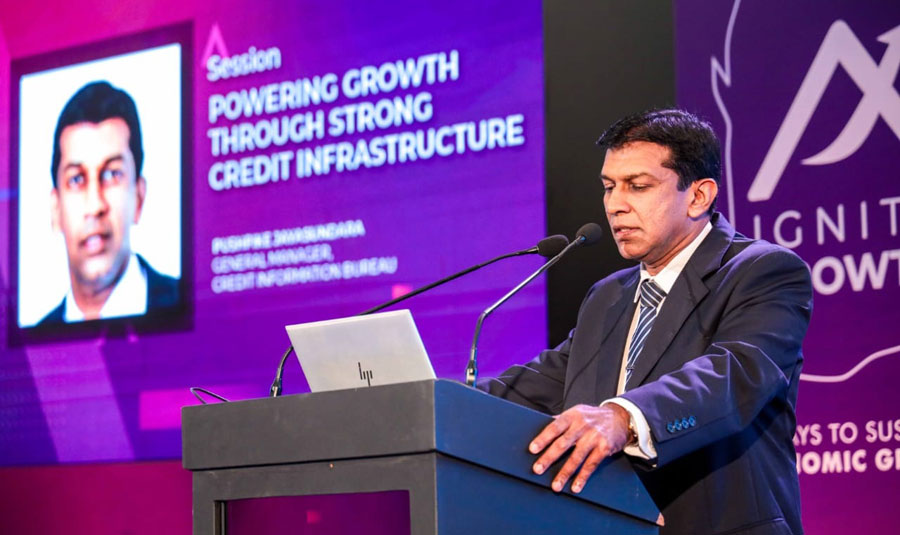Jayasundara was a speaker at the event, presenting under the topic of ‘Powering Growth through Strong Credit Infrastructure’.
He highlighted the pivotal role of CRIB in ensuring the stability and growth of Sri Lanka’s credit infrastructure and, by extension, the overall economy.
He emphasized that by collecting, collating, and disseminating credit-related data and reports with a strong focus on data integrity, security, and value addition, CRIB serves as a key enabler in strengthening the credit ecosystem.
Additionally, he noted that CRIB plays a vital role in enhancing credit accessibility and inclusivity by addressing the prevailing credit information asymmetry in the market, which often hinders the flow of credit to low- and middle-income communities.
He further stressed the importance of capturing the most current and comprehensive credit information, leveraging advanced technology to provide data-driven solutions that support the financial sector in optimizing credit assessments and facilitating a more efficient flow of credit into the economy.
Jayasundara emphasized the importance of financial awareness and literacy among citizens in fostering a robust credit culture and dispelling negative perceptions about the credit reporting systems.
As an example, he pointed out that a common misunderstanding among the public—that CRIB engages in blacklisting borrowers - clarifying that this is entirely a misconception, as CRIB does not categorize borrowers in any manner, which is entirely contrary to the bureau’s objectives.
Instead He clarified that CRIB s dedicated to enhance credit flow by bridging the information gap in the credit market, thereby facilitating responsible lending.
To achieve this, he highlighted CRIB’s continuous efforts over the past year to promote financial awareness, discipline, and independence among citizens.
These initiatives have focused on educating the public and businesses on the benefits of maintaining good credit health, their right to access their own credit information, and the ability to obtain their personal credit reports directly from CRIB through www.crib.lk.
Pushpike Jayasundara further emphasized the importance of creating credit profiles for unbanked individuals, enabling them to access regulated financial institutions.
To support this initiative, CRIB is in the process of introducing a powerful new tool—the MSME Scorecard—in addition to the National Credit Score already in place.
He highlighted that CRIB is actively engaging with relevant authorities to incorporate non-traditional data sources such as utility payments, telecommunications, and insurance records, aligning with international best practices.
By leveraging these alternative data sources, CRIB aims to reward individuals for their financial behavior, providing them with opportunities to obtain credit facilities at lower interest rates and on favorable terms—without the need for tangible collateral.
This initiative will help prevent vulnerable individuals from resorting to informal lenders, thereby fostering a more inclusive and equitable financial ecosystem.
"Access to credit is essential for driving local economic activity, as economic growth is directly proportional to the availability and flow of credit within a country," Jayasundara stated.
CRIB extensively collects and processes credit data on a monthly basis, applying over 600plus validation rules and audit measures to ensure its integrity, reliability, and security.
In 2023, CRIB successfully migrated to an advanced IT platform, enhancing operational efficiency.
In 2024, the bureau further digitalized most of its services as part of its digital transformation strategy, enabling seamless, real-time access to credit information.
The CRIB Credit Score, an internationally recognized risk assessment tool, now allows borrowers to access credit more efficiently and under improved terms.
Looking ahead, Sri Lanka’s SME sector is expected to benefit from the forthcoming SME Score tool, currently under development in collaboration many authorities.
Given that SMEs often lack tangible assets for collateral, this tool will incorporate non-traditional data sources to establish reputational collateral, helping them secure financing from formal financial institutions.
Jayasundara also presented key statistical insights on Sri Lanka’s credit ecosystem, highlighting credit distribution across various sectors and the crucial role of credit inclusivity in maintaining a balanced economic environment.
He pointed out that a significant portion of the population remains outside the formal financial sector, lacking credit histories and, as a result, facing barriers to structured lending opportunities.
He further noted that Sri Lanka's lending framework is predominantly collateral-based, which restricts access to credit for many individuals and businesses.
To address this, CRIB has introduced advanced data-driven solutions, such as the CRIB Credit Score, which serves as a robust risk assessment tool.
By promoting the use of credit scores, CRIB seeks to shift the credit eco system towards lending against creditworthiness of borrowers rather than availability of physical assets.
Credit scores are generated using statistical modeling techniques applied to raw credit data from over 20 key data points.
These models analyze financial behavior patterns, establish relationships between variables, and assess an individual or entity’s probability of default over the next 12 months.
CRIB remains committed to encouraging financial institutions to leverage these credit assessment tools, ultimately improving financial access and fostering a more resilient and inclusive credit ecosystem in Sri Lanka.
A significant milestone for CRIB will be the upcoming launch of the electronic Secured Transactions Registry (STR), aligning with Secured Transaction registry Act No. 17 of 2024.
This initiative will facilitate the acceptance of movable assets—such as machinery, inventory, equipment, vehicles, livestock, account receivables, securitizations, investment instruments and intellectual property—as collateral for loans, promoting financial inclusion and expanding lending opportunities.
The speech concluded with an engaging Q&A session, where Jayasundara addressed queries on CRIB’s ongoing efforts to enhance its services and integrate with Sri Lanka’s evolving digital financial infrastructure, aligning with international best practices.
He also highlighted how credit scores are widely used in developed nations for purposes beyond lending, looking ahead, he noted that maintaining a strong CRIB score could serve as an incentive for better financial discipline and social mobility in Sri Lanka.






















